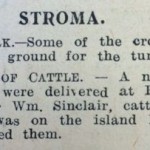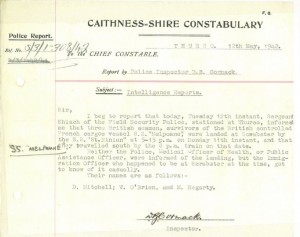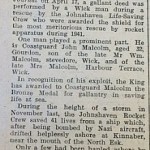While the Germans continued to prepare for their own summer offensive in Russia, this week the Soviet army under Timoshenko launched a major offensive to recapture Kharkov in the south, but met with fierce resistance from Paulus’s 6th Army. Also this week, British and Chinese forces retreated from Burma, allowing the Japanese to complete their occupation of the country, and monsoon rains brought operations in Southeast Asia to a standstill.
 This was a busy time for the farmers of Caithness. On the island of Stroma, the John O’Groat Journal reported that “some of the crofters are dressing the ground for the turnip crop”, and “a number of store stirks [young heifers or bullocks] were delivered at Huna this week for Mr William Sinclair, cattle dealer, Wick. He was on the island last week and purchased them.”
This was a busy time for the farmers of Caithness. On the island of Stroma, the John O’Groat Journal reported that “some of the crofters are dressing the ground for the turnip crop”, and “a number of store stirks [young heifers or bullocks] were delivered at Huna this week for Mr William Sinclair, cattle dealer, Wick. He was on the island last week and purchased them.”

Even though the focus of Germany had shifted to Russia, Britain was not yet free of the fear of attack. Schoolchildren had their gas masks inspected regularly, as the log book from Pulteneytown Academy for 11-12 May shows: “Distributed 7 new respirators to Class IV(a) in place of defective ones.”
 Children across the county faced a more immediate threat than enemy gas attacks, however. The log book entry for Bower School on 13 May ominously reads: “Time-table considerably upset. School Dentist here from 11:45 a.m. to 3.10 p.m.
Children across the county faced a more immediate threat than enemy gas attacks, however. The log book entry for Bower School on 13 May ominously reads: “Time-table considerably upset. School Dentist here from 11:45 a.m. to 3.10 p.m.

Merchant shipping was still suffering at the hands of U-boats and the Luftwaffe, and survivors were still being landed in Caithness. On 12 May Inspector Cormack of Thurso wrote, “I beg to report that today, Tuesday 12th instant, Sergeant Shiach of the Field Security Police, stationed at Thurso, informed me that three British seamen, survivors of the British controlled French cargo vessel S.S. “Melpomne”, were landed at Scrabster by the S.S. “St. Ninian” at 5-15 p.m..on Monday 11th instant.”
 Finally this week, The John O’Groat Journal reported that Coastguard John Malcolm from Wick had been awarded the Bronze medal for gallantry during a rescue by the Johnshaven Life-Saving Crew last November. A ship which had been bombed by a German raider had drifted ashore at Kinnaber in a storm. A rocket line had been fired to the ship but had become fouled. “Between the beach and the obstruction was a 150-yard stretch of water churned into thunderous surf by the gale. While his comrades ashore kept the line taut, Coastguard Malcolm hauled himself out hand over hand to the obstruction. Time and again the seas swept over him. Clearing the line at the third attempt, he was flung high in the air, but held on grimly and was hauled ashore.” As a result of his courageous action, 41 lives were saved.
Finally this week, The John O’Groat Journal reported that Coastguard John Malcolm from Wick had been awarded the Bronze medal for gallantry during a rescue by the Johnshaven Life-Saving Crew last November. A ship which had been bombed by a German raider had drifted ashore at Kinnaber in a storm. A rocket line had been fired to the ship but had become fouled. “Between the beach and the obstruction was a 150-yard stretch of water churned into thunderous surf by the gale. While his comrades ashore kept the line taut, Coastguard Malcolm hauled himself out hand over hand to the obstruction. Time and again the seas swept over him. Clearing the line at the third attempt, he was flung high in the air, but held on grimly and was hauled ashore.” As a result of his courageous action, 41 lives were saved.
